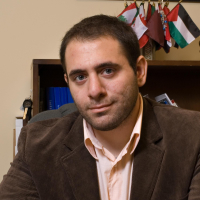Last week in Tel Aviv, the Israeli Nakba activists group Zochrot (“Remembering” in Hebrew) attempted to recite the names of depopulated Palestinian towns at Israel’s Independence Day celebration. They were repressed.

On the same day, The New York Times published an article recycling Israeli President Shimon Peres’s narrative of the period:
“Israel, mathematically or tangibly, should not have been established…prior to the War of Independence, there was no chance. We were 650,000, they were 40 million. They had seven armies, we had barely 5,000 soldiers… So tangibly we were on the brink of collapse, but we won anyway, thanks to hidden powers. Ever since, for all of my life, I have tried to understand those immeasurable powers.”
The founding Zionist myth, reflected here by Peres’s words, echoes the American mantra of “manifest destiny” and fits perfectly into the Evangelical Christian narrative: Israel’s creation was a miracle brought about by divine intervention.
But this narrative doesn’t fit the facts. Had editors of The New York Times read their own reporting from the time, they too may have thought twice before uncritically reprinting Peres’s chimerical story.
In an article entitled “Palestine Jews Minimize Arabs: Sure of Superiority Settlers Feel They Can Win Natives By Reason or Force,” the Times reported in 1947, “whatever their degree of superiority complex, however, the Jews are certainly confident of their ability to bring the Arabs to terms—by persuasion if possible, by might if necessary.”
Then, in a 1948 feature story about the Zionist militias entitled, “The Army Called ‘Haganah,’” the Times reported about the Haganah:
[It] has a nucleus of 30,000 men who served in the British forces. Three thousand of them served in the RAF, including more than forty pilots. More than 300 served in the Commandos and 4,000 in the Jewish Brigade in action in Italy. The British estimate Haganah's active membership at anywhere from 60,000 to 80,000.
In fact, throughout the war, the Zionist forces outnumbered the combined forces of the Arab armies who were under-armed, undertrained and decentralized in comparison. Prior to the start of the war, the Zionists had mapped out the Arab villages throughout Palestine and amassed a data collection effort that was far ahead of the military intelligence capabilities of any Arab state at the time.
If anything, given the realities of history and the disparity of power, it would have been something of a miracle if the Zionists had not been victorious.
This was not the outcome of a divine intervention or mysterious “hidden powers,” as Peres puts it. Rather, this was the expected triumph of an economically and militarily superior state-like Zionist force over a far weaker, disorganized native population with little means of defending themselves.
Peres, of course, should know better. He was one of the tens of thousands of Haganah members The New York Times wrote about 64 years ago. In fact, among other things, he was responsible for arms procurement! Whatever “hidden powers” Peres is talking about were not so hidden to the journalists of the day.
So why perpetuate this myth? Why tell a fairytale about the foundation of the state of Israel?
The answer is simple: challenging the foundational myths of Zionism shakes it at its core. For this reason there are two main Zionist interpretations of this history. There is that of Peres and others who might call themselves “liberal Zionists,” who bask in the mythology because acknowledging the truth is too troubling. Then there is that of Benny Morris, who knows the history all too well, and is happy to justify it.
Peter Beinart writes, “Acting ethically in an age of Jewish power means confronting not only the suffering that gentiles endure but the suffering that Jews cause.”
This tenet, a central part of the “liberal Zionist” awakening exemplified by Beinart and others, is meaningless unless it can also be applied to the events of 1948, breaking through the Zionist mythology which advances a dogmatic and false Israeli “David and Arab Goliath” dichotomy.
Only at that point can we begin moving forward.
The repressive actions of the State of Israel today toward some of its own citizens who bravely challenge this mythology only highlights its unwillingness to come out of the proverbial cave.





